Buy a Douglas Mattress Today, Get a FREE Comfort Sleep Bundle!*
*Terms & Conditions: While supplies last. The offer applies to a maximum of one (1) Comfort Sleep Bundle of the same size as the mattress added to the cart. The Comfort Sleep Bundle comes with 2 pillows, 1 mattress protector, 1 sheet set, and 2 pillow protectors on orders of a Full/Double, Queen, King, Cal. King, RV Three Quarter, or RV Short Queen size mattress; 2 pillows, 2 mattress protectors, 2 sheet sets, and 2 pillow protectors on orders of a Split-King size mattress; 1 pillow, 1 mattress protector, 1 sheet set, and 1 pillow protector on orders of a Twin XL, Twin or RV Bunk Small mattress. Offers cannot be applied retroactively. Our General Return Policy applies to any returns. Offer subject to change without notice.
Or: Upgrade to a Premium Sleep Bundle + Duvet Set for Only $149!**
*Terms & Conditions: While supplies last. The offer applies to a maximum of one (1) Premium Sleep Bundle of the same size as the mattress added to the cart. The Premium Sleep Bundle comes with 2 adjustable memory foam pillows, 1 mattress protector, 1 bamboo sheet set, 1 duvet, 1 duvet cover and 2 pillow protectors on orders of a Full/Double, Queen, King, or Cal. King; 2 adjustable memory foam pillows, 2 mattress protectors, 2 bamboo sheet sets, 1 duvet, 1 duvet cover and 2 pillow protectors on orders of a Split-King size mattress; 1 adjustable memory foam pillow, 1 mattress protector, 1 bamboo sheet set, 1 duvet, 1 duvet cover and 1 pillow protector on orders of a Twin XL, or Twin. Offers cannot be applied retroactively. Our General Return Policy applies to any returns. Offer subject to change without notice.






